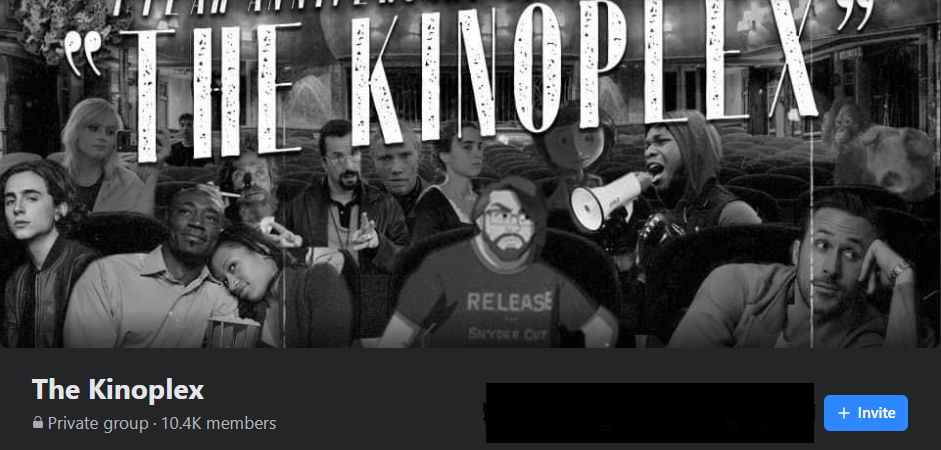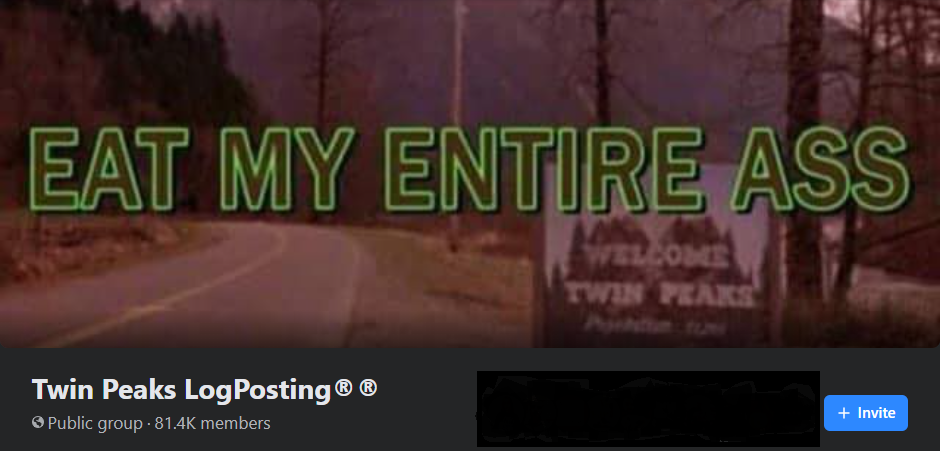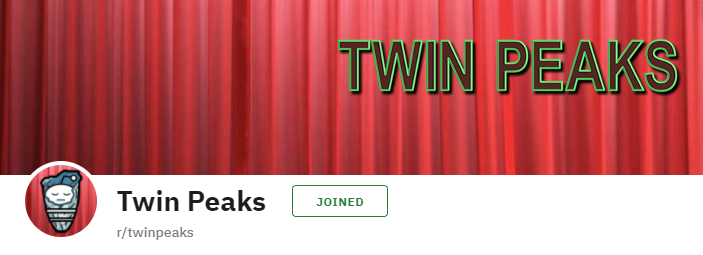LYNCH’S COMMUNITY
For my observational approach to Lynch’s Community, I decided to take a peripheral member approach, which entails “interacting closely enough with members to establish an insider’s
identity without participating in those activities constituting the core of group membership” (Adler, Adler, 1994). This means I consider myself a fan of Lynch and his work, and see myself as apart of his fan community but rarely engage with it. So my experience after watching episodes and the series as a whole sort of elevated my appreciation for Lynch, his work, and his fan community. There were three main platforms I used when interacting and observing Lynch’s community. I would usually go from watching an episode or two to browsing one of these platforms on either my phone or desktop computer. These were Facebook (The Kinoplex and Twin Peaks Logposting), Reddit (r/twinpeaks) and YouTube (DAVID LYNCH THEATER). And while I never posted on any of these platforms and interacted with the community in anyway, I still felt involved. Christine Hine makes a good point in saying, “On other platforms, content is generally public and “lurking” or passive reading is the norm for a significant proportion of community participants and therefore, to an extent for the researcher” (Hine 2015). This explains my experience and interaction with these platforms and community I was researching.




The two Facebook groups was something I browsed (and still browse) daily. Both of these groups are mainly shit-posting groups but every now and then I’d come across a few interesting opinions. For example some members weren’t fans of Lynch’s work like a user in The Kinoplex posted a thread that read, “ITT: Times you felt Filtered (A piece of entertainment or media which “filters out” uncultured people)”. A thread started in the comments with, “I just couldn’t watch twin peaks. Stopped at episode 3 with a massive what the fuck am I watching visage”, and someone responded with “Yeah that’s pretty much the reaction to all David Lynch directed stuff”. While I absolutely adore Lynch and am pretty biased towards him, I can understand why one might not be a fan of his work, its not for everybody.

Reddit was a similar experience to the Facebook groups, but I felt that I got some insightful perspectives, theories, new details, and interpretations from users on the site. An interesting theory I came across was how season 3 (The Return) is a retelling of the Greek myth “Abduction of Persephone”. And finally YouTube, which I found Lynch’s channel ‘DAVID LYNCH THEATRE’ and the community to be wildly wholesome. Lynch uploads weather reports daily and always adds a nice little wholesome note of what he’s been thinking of that day. For example, a weather report uploaded on September 26th, Lynch stated how he had been thinking of trees that day, and how beautiful and important they are. While researching the fan community of Lynch, I came across the ethical issues of privacy. While I wanted to link and quote the people I was researching and looking at, I wanted to respect their anonymity. As Milena Popova points out in her Digital Autoethnography of fan studies, “the fact that content on social media and other internet sites is publicly accessible in theory does not mean that those posting the content necessarily view it as such” (Popova, 2020).

CONCLUSION
To conclude I think what makes me love this show, Lynch, and his community are one in the same. So much of Lynch goes into his work that they sort of feel like windows into his mind. His fan community is packed with die-hard fans of the works with so much to say and add in terms of fan art, theories, interpretations and opinions. The show is weird, quirky, funny, interesting, dark yet optimistic and hopeful. And Lynch is in my mind, all of these things too. His persona seeps into everything he creates and always leaves me intrigued and wanting to find out more, and the more I look into Lynch and his work, the more I want to know. He leaves his work completely open to interpretation just as he leaves himself, and I believe that this is the answer to why David Lynch interests me and holds a special place in my heart.
ACADEMIC SOURCES
Adler, P, & Adler, P 1994, ‘Observational Techniques.’ https://psycnet.apa.org/record/1994-98625-022 [9th November
Hine, C 2015, ‘Ethnography for the Internet: Embedded, Embodied and Everyday.’ https://pdfs.semanticscholar.org/da50/4fe4636040c1beb7b19680857d07c009e7f3.pdf?_ga=2.204413463.629877214.1605264928-928093212.1605264928 [11th November 2020]
Popova, M 2020, ‘Follow the Trope: A Digital (Auto)ethnography for Fan Studies.’ https://moodle.uowplatform.edu.au/pluginfile.php/2509008/mod_resource/content/1/Follow%20the%20trope-%20A%20digital%20%28auto%29ethnography%20for%20fan%20studies.pdf P. 3 [12 November 2020]